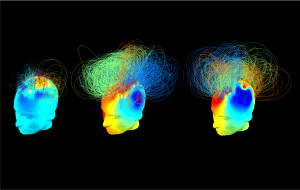Identifying Hidden Minds in Impaired Consciousness
This study uncovers hidden signatures of brain networks that could support consciousness in patients who are unresponsive and seemingly vegetative, but who demonstrate signs of covert awareness.
University of Cambridge researchers Dr Srivas Chennu, Dr Tristan Bekinschtein and their collaborators employ the science of networks to characterise the brain networks that support human consciousness and how they are affected in pathological states of low awareness, like the vegetative state.
In a study publishing this week in PLOS Computational Biology, the authors analyse brain networks in 32 patients diagnosed as vegetative and minimally conscious, measured with electroencephalography, and compare them to healthy adults. They show that the rich and diversely connected networks that support awareness in the healthy brain are characteristically impaired in patients. However, some unresponsive vegetative patients (who show signs of hidden awareness by following commands like imagining playing tennis) have well-preserved brain networks that look similar to those of healthy adults.
Identifying the neural signatures of consciousness remains an elusive yet fascinating challenge to current cognitive neuroscience, but it takes on an immediate clinical and societal significance in patients diagnosed as vegetative and minimally conscious. This research could improve clinical assessment and help identify patients who might be covertly aware despite being uncommunicative.
The researchers say: “Being able to detect the recovery of brain networks in patients, alongside or even before they show behavioural signs of improvement, is very promising. However, further work is essential to translate these scientific advances into viable tools that can be reliably used at the patients’ bedsides to accurately inform and guide their clinical care.”
Brain networks in two behaviourally similar vegetative patients (left and middle), but one of whom imagined playing tennis (middle panel), alongside a healthy adult (right panel).
Image credit: Srivas Chennu
All works published in PLOS Computational Biology are Open Access, which means that all content is immediately and freely available. Use this URL in your coverage to provide readers access to the paper upon publication: http://www.ploscompbiol.org/article/info:doi/10.1371/journal.pcbi.1003887
The full press release is available here Chennu Press Release 16-Oct (2).

 MRC Cognition and Brain Sciences Unit
MRC Cognition and Brain Sciences Unit







